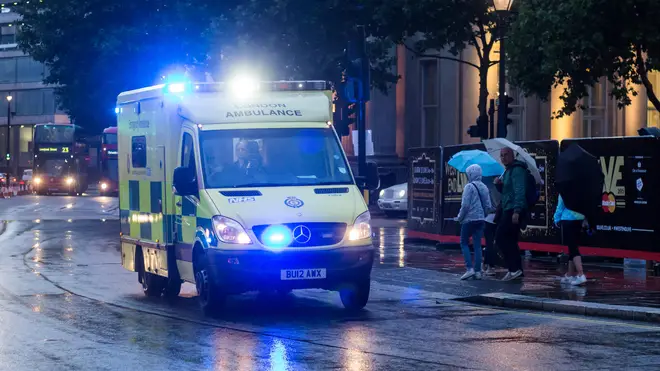
Henry Riley 7pm - 10pm
11 November 2021, 13:08 | Updated: 11 November 2021, 17:46

Ambulance trusts are failing to get to 999 calls on time, leaving some patients with no care for hours.
Last month Ambulances in England recorded the longest average response time since current records began in August 2017, NHS England figures show.
In October, paramedics on average took 53 minutes and 54 seconds to respond to emergency calls, such as burns, epilepsy and strokes - hugely missing the 18-minute target.
Response times for urgent calls - such as late stages of labour and non-severe burns - averaged three hours, nine minutes and 58 seconds.
Whilst the average response time for the most urgent incidents - defined as calls from people with life-threatening illnesses or injuries - was nine minutes and 20 seconds, compared with a target of seven minutes.
NHS England say the wait time reflects the increase in calls after receiving around 20,000 more "life-threatening" call outs than this time last year.
Read more: Chaos as new care home vaccine policy comes into force
Read more: No jab no job: Over 120,000 healthcare workers could quit over mandatory Covid vaccine

Unvaccinated NHS staff could be moved to non-patient-facing roles
Now every ambulance trust in England has been put on a high level of alert due to the services being under significant strain.
Professor Stephen Powis, NHS national medical director said: "With the highest number of 999 calls ever answered for a single month, the busiest October on record for major A&E, and the rollout of boosters as part of the successful NHS vaccination programme, there is no doubt pressure on the health service remains incredibly high.
"But, despite high demand, NHS staff are going above and beyond to see more patients and deliver millions more tests, checks, treatments and operations.
"Increasing numbers are coming forward for treatment and this is expected to go up, but it remains really important people do not delay seeking help from the NHS if they feel unwell."
Read more: MPs 'who got drunk' on official Remembrance Day trip criticised by Defence Secretary
Read more: Does your MP have a second job? Find out here
The figures come after concerns were raise about a huge healthcare staff shortage following the introduction of mandatory vaccines for all NHS staff in England.

Unison rep hits out at NHS no jab no job plans
According to Government estimates, as many as 123,000 healthcare workers could refuse the Covid-19 vaccine despite the fact they face unemployment.
Earlier, Matthew Taylor, chief executive of the NHS Confederation, said a survey of more than 450 leaders across all parts of the health service found nine out of 10 said the situation they now face is "unsustainable" and patient care is being compromised.
According to NHS union Unite the NHS is already seeing a severe "recruitment and retention crisis" with exhausted staff still battling the continuing 21-month-old pandemic.